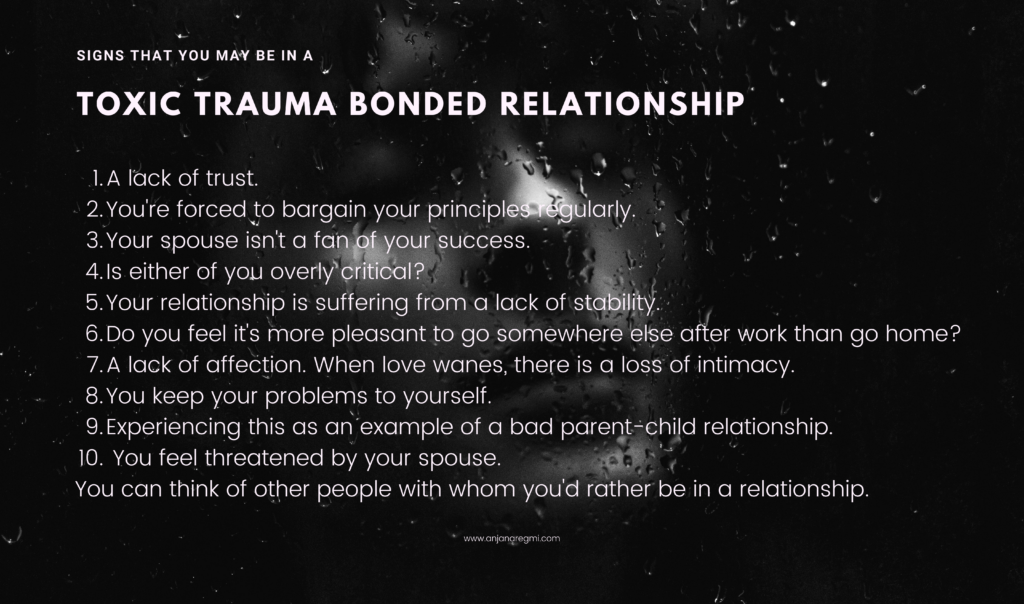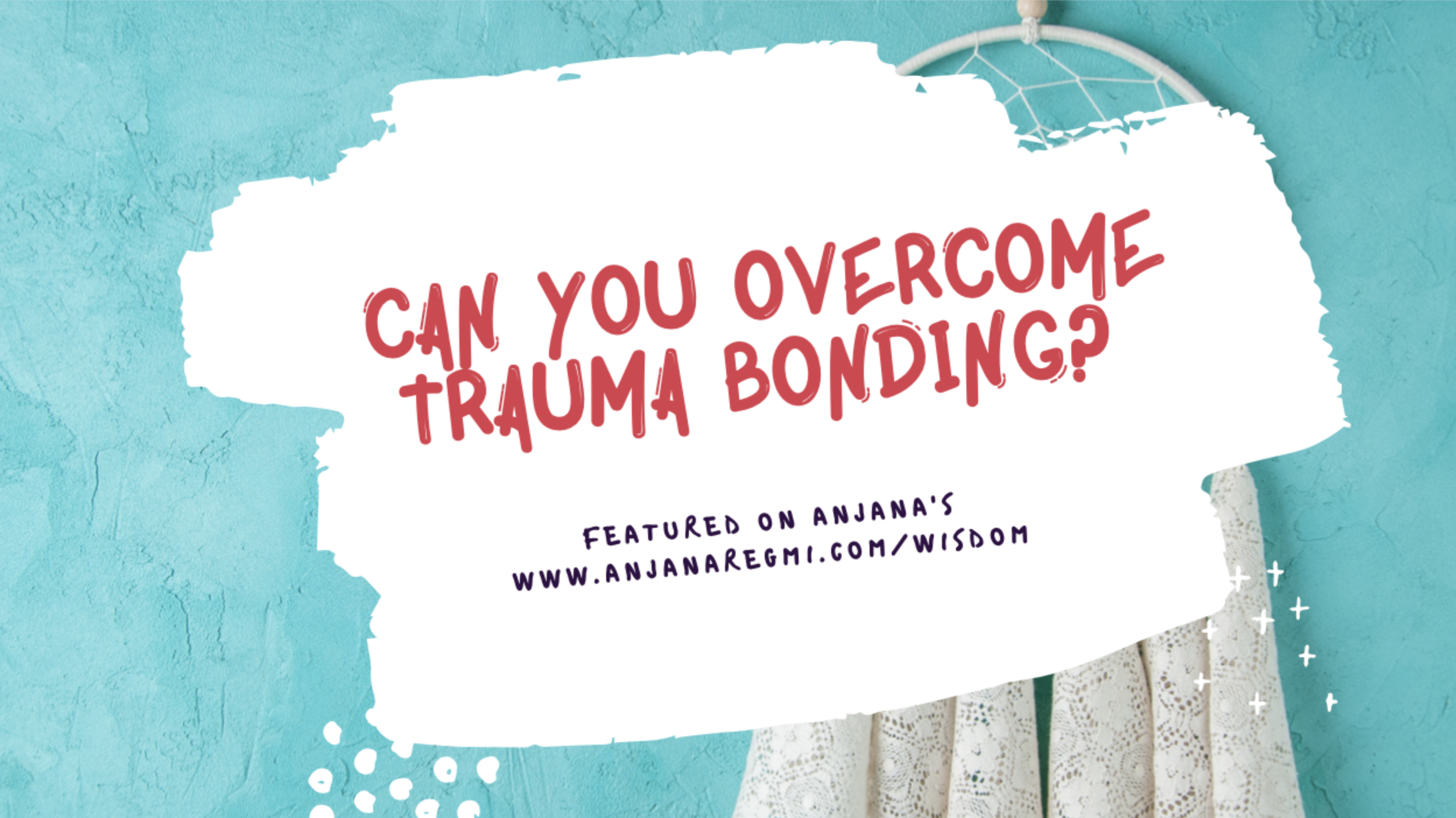Trauma bonding is a type of attachment disorder that occurs in people who have undergone traumatic experiences. It is a term used to describe the phenomenon of trauma bonding in abusive relationships. This article explores how trauma bonding can occur, why it’s bad for your mental health, and how to stop the process from happening. If you are currently experiencing this problem or are looking to learn more about it, then read on!

Why is trauma bonding bad?
Trauma bonding is bad for your mental health because it can cause you to become attached to someone harmful or abusive. This type of attachment can be extremely destructive and lead to a lot of emotional pain. It’s also unhealthy because it can keep you trapped in an abusive relationship.
Continuing to live in such relationships may draw you into living in a toxic relationship.
You may wish to be in a relationship, but not all relationships are created equal. Some relationships cause more problems than they’re worth. Although being alone may be a bummer at times, it is often preferable to being in an unpleasant connection.
Firstly understanding what is trauma bonding will help you look at the symptoms and neurological challenges. If you’re currently in a trauma bonded relationship, then there are ways that you can stop trauma bonding from occurring.
One effective way to break the trauma bond is by leaving your abuser or a harmful relationship. You may find this process difficult, but it’s important to do if you want to live a healthy life again! But before we look at how to break away from this bond, let’s look at why trauma bonding occurs?
Why does trauma bonding occur?
Trauma bonding occurs when the abuser and victim become emotionally attached as a result of their traumatic experiences together. The abuser often uses fear, intimidation, and violence to control the victim, which creates an environment of trauma and chaos. This leads to trauma bonding, which the victim may experience as an intense emotional bond with their abuser.

How trauma bonding victims experience an intense emotional bond with their abuser?
Trauma bonding can weaken victims, trauma bonds are difficult to break. It has been suggested that this phenomenon occurs when the relationship consists of two people where one holds power over another.
Trauma bonds can develop between captors and hostages, cult members who are trapped by their beliefs, victims of sexual assault or domestic violence.
This bond is formed when the victim feels grateful to his abuser for not harming them during a traumatic event.
The reason trauma bonding occurs is that trauma victims lack the power to escape and therefore develop a strong emotional bond with their abuser. The victim begins to believe in the abuser’s earlier statements that were designed to humiliate and belittle them. Victims may be comfortable believing in restricting their potential for growth because of the uncountable times their self-worth and self-respect have been questioned.
Trauma bonds can be very dangerous as they allow abusers to maintain control over their victim’s minds, leaving them unable to think for themselves.
Make a list of the pros and cons. Consider if your connection is improving or complicating your life. You are entitled to nothing less than perfection!
Is trauma bonding healthy?
NO! Trauma bonding does not signify a healthy relationship between two people who care for each other and are willing to work through conflict to grow closer together. Instead, trauma bonds symbolise abuse and trauma that has been inflicted on one person by another.
This type of relationship is not founded on mutual respect but instead relies on fear, intimidation, and manipulation.
Trauma bonding is a type of relationship where trauma is used to keep someone connected to another person. Traumatic events can create powerful emotional attachments that are difficult to break free from. This occurs because the brain releases oxytocin, which is sometimes known as the “cuddle hormone“. Oxytocin creates feelings of pleasure and safety and can make people feel addicted to the person they are bonded to.
This relationship is often unhealthy and can be very damaging. It can keep someone in an abusive or dangerous relationship, and it can be very difficult to break free from. The trauma bond is usually much stronger than any other type of emotional attachment, and it can be hard to overcome.
The human brain is wired at birth to respond with fear, stress and anxiety towards stimuli but through the therapeutic process of neuroscientific research we can better understand how this works. Understanding the neuroscience behind trauma healing and its role in recovery allows you to look at neuroscience and neural networks, what happens when old patterns re-emerge, and the action of building new neural networks.

There are several signs that you may be in a toxic trauma bonded relationship:
- A lack of trust is a major stumbling block. It doesn’t matter if you don’t trust the other person or they don’t trust you. When there is a general distrust, relationships are extremely stressful. There is never any calm in your life.
- You’re forced to bargain your principles regularly. When you’re compelled to live outside of the tenants that you consider most essential, your self-respect takes a hit. It’s simpler to be at your finest in a healthy relationship.
- Your spouse isn’t a fan of your success. They claim that you discover who your real friends are when things are tough, but this is also true during times of triumph. When you’re doing well, it’s not unusual for friends and family to be unsupportive. You don’t want someone in your life that behaves like this.
- Is either of you overly critical? Are you both too turned off by the other’s ideas and activities? Your hobbies and projects should be given respect. It applies to both partners. You could have a stronger relationship if you weren’t so contemptuous of your partner.
- Your relationship is suffering from a lack of stability. Your relationship is more stressful than it needs to be, and you’re being damaged by it.
- Do you feel it’s more pleasant to go somewhere else after work than go home? What’s worse than spending a stressful day at work and deciding you’d rather sit in a coffee shop alone than return home to your spouse? It’s appealing to have a haven from the stress of everyday life.
- A lack of affection. When love wanes, there is a loss of intimacy. Consider why you don’t desire to touch each other anymore.
- You keep your problems to yourself. It would be great to be able to trust your partner when you have something delicate to discuss. If you find yourself resisting sharing, it might indicate that your partnership isn’t sustainable. Ideally, your spouse is also your best friend.
- Experiencing this as an example of a bad parent-child relationship. Any children who are exposed to this dynamic are put at risk. Children’s development should be enhanced by relationships. Children that are scared or discouraged are signs of trouble.
- You feel threatened by your spouse. There is no need to risk your safety in a relationship. Make your health and well-being a top priority in your life.
- You can think of other people with whom you’d rather be in a relationship. Do you find yourself wishing you could be in a relationship with a friend or coworker instead of with your current partner? Something is amiss if you’re imagining yourself with someone else.
It may be difficult to leave a toxic relationship. It’s not pleasant to confront the world on your own, especially for a time. However, spending some time alone has its benefits.
Hopefully, you’ve concluded that your relationship is healthy, supportive, and a source of inspiration.
If you believe your relationship is toxic and trauma bonding is becoming a norm, take the time to investigate further. Be willing to get help from a relationship professional, too.
Before we end….
Often, trauma bonding does not start as an issue within the relationship itself – instead, it often starts with problems that are happening in other parts of life like at school or work. You can see, when it comes to relationships, there can be all sorts of different issues that arise. From trauma bonding to attachment disorders, these problems can cause a lot of pain and chaos within a family unit.
It’s something that often goes unrecognised, and it’s hard to see the damage that it does until it’s too late. This type of attachment is dangerous and can have long-term consequences.
That’s where professional help from a relationship psychotherapist or family therapist can make a difference.
Although the power of self-healing is a great starting point, professionals such as these can explain why trauma bonding is a typical issue among persons who live in toxic relationships, and it’s especially prevalent when there are problems within the family unit. This can be an extremely traumatic experience for those going through this type of trauma because they feel as though there is no other option but to stay with their abuser – even if that means enduring physical and emotional trauma regularly.
Consult with a professional to explore ways you can get over trauma bonding.
Trauma bonding with toxic relationships isn’t worth your time or peace of mind.
It is a work in progress, but it is possible to overcome trauma bonding.
You’d like to do the work, wouldn’t you?




